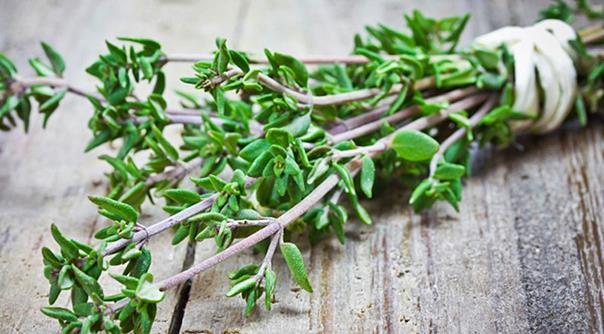A traditional Mediterranean culinary herb, Thyme is a natural ingredient that will not only enrich the taste of your meals, but will improve your physical and mental health as well.
Thyme has powerful antibacterial, antiviral, diuretic, antibiotic, antiseptic, antispasmodic and expectorant properties. It is a natural effective remedy during cold and flu season. Besides killing microbes, thyme can eliminate the toxins from your body as well. It can support the formation of white blood cells and increase resistance to invading organisms, thus boosting the immune system.
Health Benefits of this Powerful Herb Thyme
Thyme is very beneficial for treating respiratory infections, flues, colds, sore throats, coughs, asthma, catarrh, bronchitis, whooping cough, and laryngitis.
- For nose, throat and chest infections, inhale
- For mouth and gum infections (such as thrush, gingivitis), use in toothpaste or mouthwash/gargle
Many studies showed the effectiveness of essential oils, including thyme as expectorants. It has been shown that they have the ability to increase mucus secretions to relieve dry coughs. Inhalation is particularly effective for treating chronic infections. Inhalation in small amounts can provide the best results; too strong has the opposite effect.
Thyme is very useful for chronic fatigue, depression, illness, and insomnia. It can stimulate circulation, increase memory and increases low blood pressure. It strengthens both, body and mind.
Thyme essential oil has potent antibacterial properties and it has been used in soapy solutions for disinfecting hands before surgery. A French study showed that thyme can destroy 90% of microbes within 3 hours, when used in a vaporizer.
Additional Uses of Thyme
- Treats urinary tract and bladder infections.
- Treats Candida and vaginitis
- Kills nail fungus
- Kills parasites
- An ingredient in natural hand sanitizers
- Hot compress to relieve arthritis, gout, rheumatic pain, muscular aches and pains, sprains, sports injuries, and sciatica
- Crush the fresh herb or use diluted oil as first aid on insect bites and stings
- To treatathlete’s foot, apply the oil neat, or undiluted, making sure to protect your skin with some fatty cream
- To stimulate menstruation for weak or missing periods, use thyme in a bath or massage
- Use a 1% solution as an antibacterial wash for fresh produce
- You can use it as a face wash for treating acne or warts or as a hair tonic
Thyme essential oil contains Thymol, a compound that has the ability to increase blood flow to the skin and accelerate healing. It can also protect and increase the percentage of healthy fats in cell membranes. It has been shown that dietary consumption of thyme can increase the amount of DHA (docosahexaenoic acid, an omega-3 fatty acid) in kidney, brain, and heart cell membranes.
To treat alopecia areata, use with lavender, cedarwood, and rosemary in a mixture of grapeseed and jojoba carrier oils. Massage the mixture into the scalp daily for a few months.
Thyme may cause irritation, so it is recommended to use it with lemon, lavender, pine, rosemary, grapefruit, and bergamot.
Contraindications and Considerations for Use
You should not use thyme essential oil in its pure, concentrated form directly on your skin because it can cause irritation for those with sensitive skin. It can also stimulate the thyroid gland and lymphatic system and cause sensitization to the immune system.
This oil is not recommended for pregnant women, people with high blood pressure, epilepsy, cancer, liver damage or other serious health conditions. Make sure to consult your doctor first!
Massaging the oil into the soles of your feet is an effective way to obtain the benefits of thyme essential oil. It reaches the lower bronchial capillaries, circulatory system and the whole body (without being absorbed into the liver). You can also inhale thyme.
Source: Juicing For Health
